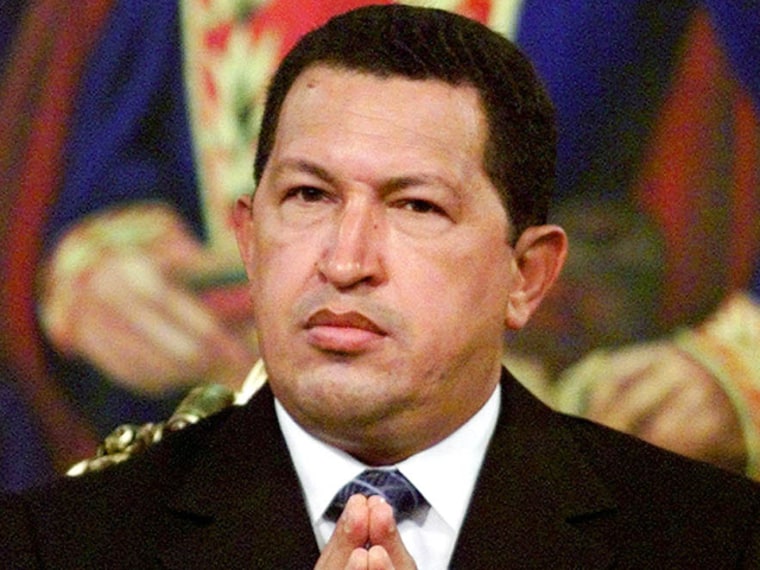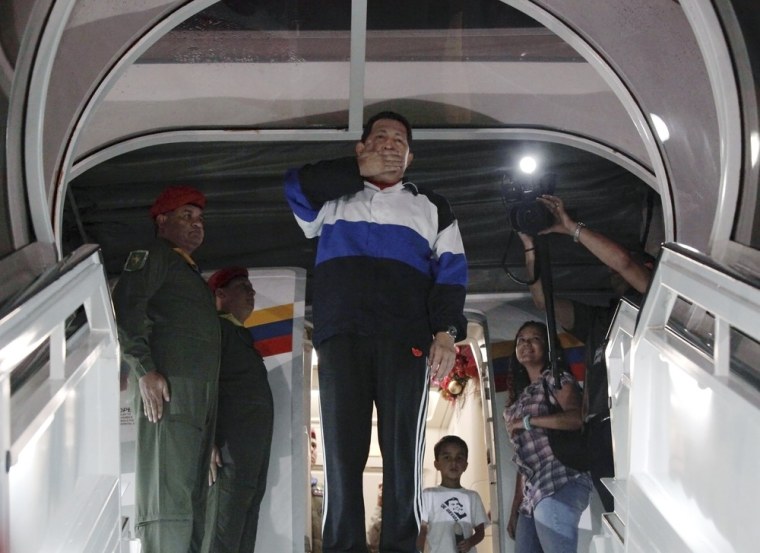MIAMI -- It’s been 40 days since anyone has publicly seen or heard from Venezuela’s President Hugo Chavez.
Keith Rosenn, a law professor at the University of Miami with extensive experience in Latin American legal affairs, asks what is on so many minds: Did Chavez die at some point after flying to Cuba on Dec. 10?
“It’s possible Chavez could be dead for a substantial period of time before we know he’s dead and why he died,” Rosenn said. “He’s in Cuba after all.”
Chavez, in Havana suffering from an unspecified type of cancer, has been treated repeatedly by doctors on the communist island.

The Venezuelan leader not only shares a special relationship with brothers Fidel and Raul Castro, but his socialist revolution is modeled in many ways after the Cuban system. Fidel ruled the country from the end of the Cuban revolution until he ceded power to Raul in 2006.
It’s highly unusual for Chavez to be gone from public view this long “for someone who craves attention,” Rosenn said.
Now 58, Chavez has seldom been out of the public eye since he assumed power in early 1999.
A former lieutenant colonel in the Venezuelan military, he grew up poor, only to wind up nationalizing and controlling his country’s vast treasure: oil.
Since assuming power, it’s estimated his country has pumped more than $1 trillion of oil onto the open market, while at the same time sharing his nation’s riches with like-minded leaders in Bolivia, Nicaragua, Peru and Cuba.
If Chavez is dead, his brand of socialism, so-called “Chavismo,” could live on “if the Chavistas who remain, remain united and are committed to his missions,” said Susan Kaufman Purcell, director of the Center for Hemispheric Policy at the University of Miami.
But the mood could shift, she said. Chavez’s power base lies among the poor, the very people who “were lied to” in the past about Chavez’s health, Purcell added.
“People were not prepared for this because Chavez suggested he was cured of cancer when he wasn’t,” she said.
Chavez handily won re-election in October 2012 but was a no-show at his Jan. 10 inauguration.
Despite his openly anti-American rhetoric, American officials will maintain a hands-off policy on Venezuela, predicted Aimee Arias, chair of political science at Florida Atlantic University.
“The U.S. and Venezuela have had a tense relationship, but the business relationship with oil has continued pretty much in place, and barring any sort of unconstitutional change or undemocratic situation after Chavez's death, I would assume that will continue,” she said.
If Chavez is indeed dead, Arias said Chavismo would have a hard time going forward without its founder.
“The movement is named after him, after all,” she said.
More Venezuela coverage from NBC News
Vice President Nicolas Maduro, a former bus driver, is currently in charge.
Some Chavez opponents, such as recent presidential candidate Henrique Carpriles Radonski, contend that Chavez missing his own swearing-in should trigger a new election within 30 days.
But Rosenn, a constitutional lawyer, interprets the document differently.
“Article 231 says that the elected candidate is to be sworn in as president on Jan. 10, but then the last sentence says if for any unforeseen reason he can not take the oath, then he will be sworn in before the Supreme Tribunal of Justice, but it doesn’t say when,” Rosenn said.
And therein lies wiggle room for Chavez’s backers.
Despite calls for calm from both Chavistas and the opposition, it’s the threat of destabilizing violence that concerns Venezuela watchers in the U.S. most.
After all, unrest in the fourth-largest oil exporter to the United States could have a big impact on Americans.
And with Venezuela’s economy already in disarray and oil exports down by 30 percent in the past 15 years, no matter who is in charge, times ahead in that country are likely to be tough.
“If he’s dead,” Purcell said, “Chavez leaves behind a country that is in pretty bad shape.”
Follow NBC News correspondent Kerry Sanders on Twitter.
Related stories:
Venezuela's ailing Chavez unable to attend swearing-in, officials say
NBC's Kerry Sanders answers questions about Chavez re-election in Venezuela's elections
Venezuela's Hugo Chavez wins 3rd term, vows to deepen socialist revolution
